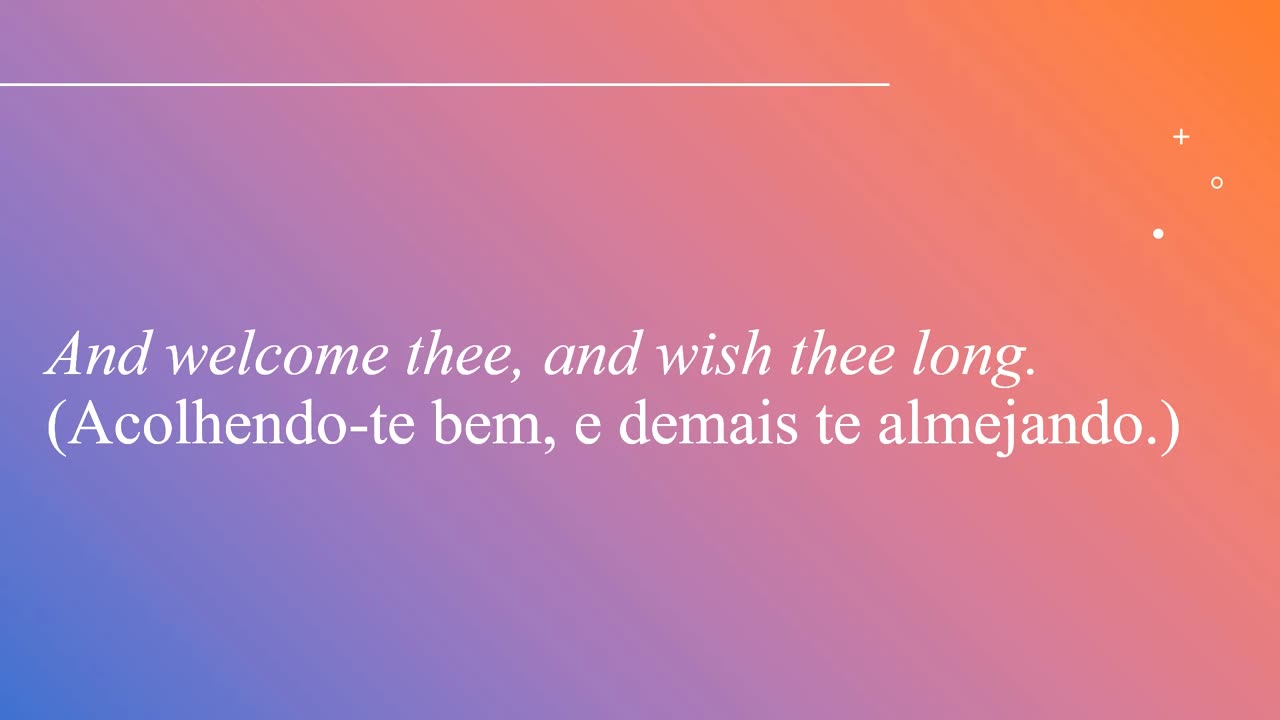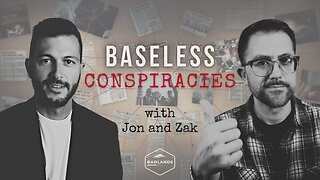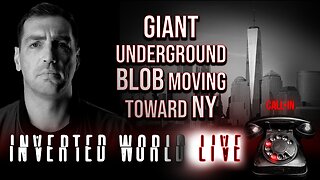Premium Only Content

Recitation of NUMBER 10 by John Milton (London, England, 1604-1674)
About the Author:
John Milton (London, 9 December 1608 – London, 8 November 1674) was an English poet, polemicist, intellectual and civil servant, serving as Secretary of Foreign Languages to the Commonwealth of England under Oliver Cromwell. He wrote at a time of religious flux and political upheaval, and is best known for his epic poem Paradise Lost (1667), written in blank verse.
Born in London, he attended Christ's College, Cambridge University, where he graduated in 1629 and obtained an MA in 1632. He read ancient and modern works in theology, philosophy, history, politics, literature and science, and in May 1638, traveled to France and Italy on a tour, met the astronomer Galileo Galilei and visited the Accademia della Crusca. Upon returning to England, he wrote prose against the episcopate in the midst of the English Civil War, and attacked William Laud, Archbishop of Canterbury. In March 1649 he was made Secretary of Foreign Languages by the Council of State. During this period he published texts in defense of republican principles, and in 1654 he was completely blind and consequently impoverished. After the English Restoration, Milton continued to defend the republic and criticize the monarchy. He went into hiding and received a warrant for his arrest, later being pardoned. He died in 1674, having been married three times.
His prose and poetry reflected deep personal convictions, a passion for freedom and self-determination, and the pressing issues and political turmoil of his time. Writing in English, Latin, and Italian, he achieved international fame in his lifetime, and his celebrated Areopagitica (1644) ranks among history's most influential defenses of free speech and freedom of the press.
William Hayley's biography, published in 1796, called him "the greatest English author", and he generally remains regarded as "one of the most prominent writers in the English language", although critical reception has fluctuated in the centuries since his death ( often because of his republicanism). Samuel Johnson praised Paradise Lost as "a poem which, with regard to design, may claim the first place, and with regard to performance, the second, among the productions of the human mind", although he — a conservator and recipient of royal patronage —described Milton's politics as those of a "bitter, surly Republican".[1] Because of its republicanism, it has been the subject of centuries of British partisanship—a hostile account by Anthony Wood in 1691, a "Nonconformist" biography by John Toland in 1698, and many others. His political tracts were consulted in the drafting of the US Constitution.[2]
(Source: https://pt.wikipedia.org/wiki/John_Milton)
.....
Sobre o autor:
John Milton (Londres, 9 de dezembro de 1608 — Londres, 8 de novembro de 1674) foi um poeta, polemista, intelectual e funcionário público inglês, servindo como Secretário de Línguas Estrangeiras da Comunidade da Inglaterra sob Oliver Cromwell. Escreveu em um momento de fluxo religioso e agitação política, e é mais conhecido por seu poema épico Paraíso Perdido (1667), escrito em verso branco.
Nascido em Londres, frequentou a Christ’s College da Universidade de Cambridge, onde graduou-se em 1629 e obteve um mestrado em 1632. Leu obras antigas e modernas de teologia, filosofia, história, política, literatura e ciência, e em maio de 1638, viajou para França e Itália em uma digressão, se encontrou com o astrônomo Galileu Galilei e visitou a Accademia della Crusca. Ao voltar à Inglaterra, escreveu prosas contra o episcopado em plena Guerra Civil Inglesa, e atacou William Laud, arcebispo de Cantuária. Em março de 1649 foi feito Secretário de Línguas Estrangeiras pelo Conselho de Estado. Durante esse período publicou textos em defesa dos princípios republicanos, e em 1654 ficou completamente cego e consequentemente pobre. Após a Restauração Inglesa, Milton continuou a defender a república e criticar a monarquia. Se escondeu e recebeu um mandado de prisão, sendo perdoado posteriormente. Ele morreu em 1674, tendo se casado três vezes.
Sua prosa e poesia refletiam profundas convicções pessoais, a paixão pela liberdade e autodeterminação, e as questões urgentes e turbulência política de sua época. Escrevendo em inglês, latim e italiano, alcançou fama internacional em sua vida, e seu célebre Areopagítica (1644) está entre as defesas mais influentes da história da liberdade de expressão e liberdade de imprensa.
A biografia de William Hayley, publicada em 1796, o chamou de "o maior autor inglês", e ele geralmente permanece sendo considerado como "um dos escritores mais proeminentes da língua inglesa", embora a recepção crítica tenha oscilado nos séculos desde sua morte (muitas vezes por conta de seu republicanismo). Samuel Johnson elogiou Paraíso Perdido como "um poema que, em relação ao design pode reivindicar o primeiro lugar, e no que diz respeito ao desempenho, o segundo, entre as produções da mente humana", embora ele — um conservador e destinatário do patrocínio real — descreveu a política de Milton como as de um "amargo e ranzinza republicano".[1] Por causa de seu republicanismo, tem sido objeto de séculos de partidarismo britânico — uma consideração hostil de Anthony Wood, em 1691, uma biografia "não-conformista", de John Toland, em 1698, e muitos outros. Seus tratados políticos foram consultados na elaboração da Constituição dos Estados Unidos.[2]
-
 2:12:28
2:12:28
Badlands Media
15 hours agoBaseless Conspiracies Ep. 144: NATO Narratives, Media Meltdowns & a Brightcore Boost with Kim Bright
109K16 -
 2:02:11
2:02:11
Inverted World Live
9 hours agoGiant Underground Blob Moving Toward NY | Ep. 85
45.9K20 -
 2:46:21
2:46:21
TimcastIRL
9 hours agoTexas GOP Greenlights ARREST WARRANTS For Dems Who FLED State | Timcast IRL
242K90 -
 3:16:50
3:16:50
Laura Loomer
9 hours agoEP137: EXPOSED: How Tucker Carlson Became Hunter Biden's Wingman
71.7K81 -
 4:22:34
4:22:34
Akademiks
8 hours agoNicki Minaj vs Dez Bryant. Trump Calls out Charlamagne. Diddy Denied Bail Again! ICEMAN soon?
57.2K3 -
 3:16:28
3:16:28
Nerdrotic
10 hours ago $9.32 earnedNerdrotic at Night 504
82.9K3 -
 8:20:30
8:20:30
Dr Disrespect
17 hours ago🔴LIVE - DR DISRESPECT - WARZONE - RANDOMLY GENERATED LOADOUTS EVENT
232K9 -
 1:36:07
1:36:07
Glenn Greenwald
12 hours agoTrump Admin Unleashes More Policies That Prioritize Israel Over American Citizens; The Smear Campaign Against Gaza Aid Whistleblower with Journalist Mel Witte | SYSTEM UPDATE #497
146K193 -
 58:14
58:14
MattMorseTV
10 hours ago $14.81 earned🔴Hakeem just lost EVERYTHING.🔴
84.4K63 -
 9:21:36
9:21:36
Rallied
14 hours ago $3.19 earnedWARZONE CHALLENGES WITH DRDISRESPECT & BOB
86K5